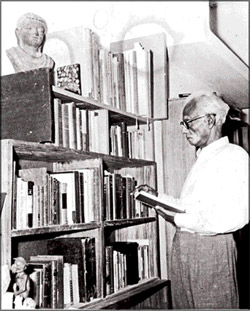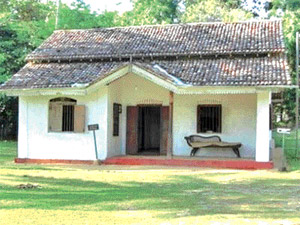|
Today is the birth anniversary of Martin
Wickramasinghe:
A great novelist and critic
Martin Wickramasinghe, acclaimed Sri Lanka's greatest writer of the
20th century, was born 121 years ago on May 29, 1890, in the village of
Koggala in the Galle district. Today, Koggala is a popular tourist
resort and part of the village is an industrial park; 120 years ago it
was a village like many other prosperous villages in the southern coast.
|

Martin Wickramasinghe would read whenever he got an opportunity. |
When he was born, a relation who was in the room at the time had come
out and announced, with great joy, "a sarong, a sarong." (in olden days
a birth of a boy was announced in this way).
It was indeed joyful news to the relations waiting outside - a boy
after eight girls, Martin Wickramasinghe has recorded this in his
autobiography 'Upan Daa Sita.' Another girl followed. So, our hero would
have been "the cock of the walk."
The house where he was born is still there, carefully maintained. It
is the only house left in that once prosperous village. How come?
It happened in 1942, during World War II. The Japanese were invading
the countries of South-east Asia. Colombo was also bombed on April 5,
1942. All residents were ordered by the Government to leave the village
within 24 hours. (Sri Lanka, then Ceylon, was a British colony and we
had to obey the British Governor's orders). The people left the village
taking their belongings and the houses were demolished to make way for
an air strip.
By some quirk of fate, or by some merit, Martin Wickramasinghe had
carried over from a previous birth, this house was not demolished. An
Air Force Officer took a liking to the house and wanted it for his
office.In 1945 after peace was declared, the air strip was abandoned and
the house vacated. The property now belonged to the government and the
house was abandoned. Over the years the land was overgrown with tangled
vegetation, but the house stood there like a lone sentinel, a memorial
to the days when this was a thriving village - until 1961. That year,
the then Government handed over the house to its rightful owner, Martin
Wickramasinghe. Today the house is well looked after and is furnished as
it would have been prior to 1942.
Folk Museum
A few yards to the west of this ancestral house is the Martin
Wickramasinghe Folk Museum set up shortly after the writer's death by
the Martin Wickramasinghe Trust comprising mainly his - heirs, as the
most fitting memorial to their father.
'Why a museum', you may ask.
Martin Wickramasinghe often wrote and always with much feeling, about
the culture and way of life of the ordinary people.
Walk through the museum and you'll see how the people learned their
letters, whom and how they worshipped, how they farmed, fished,
travelled, spent their leisure and cooked their meals. You will see the
work of smiths, carpenters, weavers and the tools with which they
worked. There are some exhibits that will take you by surprise, like the
huge elephant cart which was used in Horagolla estate to gather coconuts
after the pluck. There are also other carts used on special occasions,
and the size of some out-rigger boats are amazing.
|

The house where he was born. |
Let's get back to our writer. Andiris Gurunnanse was his first
teacher and the Guru Gedara his first school. At the age of 10 he was
admitted to Bounavista school on the hillock on the eastern shore of the
Galle harbour, to be educated in English. Unfortunately, he couldn't
stay there long as his father died, and the family could not afford to
keep the little boy in a fee-levying school.
After a break of three years which he spent learning Sinhala, Pali
and Sanskrit from a bhikkhu, he was admitted to the Ahangama Government
School. He found class work boring. It was much more fun to walk on the
beach or hang about the water's edge at the Koggala Lake. He started
playing truant and keeping company with boys older than him.
In addition to the financial difficulties the family was facing, his
truancy and escapades with boys, many his senior, was worrying his
elders. So some kinsman got him a job as a clerk in a shop in Colombo.
After a short time in Colombo he went to Batticaloa, again as a clerk .
Although routine class work was anathema (detest) to young Martin he
had acquired a love for reading and it soon became a habit.
Even while working as the shop's clerk, he would read whenever he got
a chance and book buying became a hobby. What he earned as a salary was
spent on buying books which he looked after with great care.
He also had the urge to write. His first attempt was in his early
teens when he was studying languages under Ven. Dheerananda. He wrote a
book Balopadesa. Advice to the young. He started sending short essays
under the pseudonym Hetuvaadi to the Dinamina, the Sinhala daily. They
were duly published and paved the way to a post on the paper's editorial
staff in 1920. It didn't take long for Martin Wickramasinghe to be
appointed Editor Dinamina.
It was around this time that he married Prema de Silva from Kathaluwa,
the village adjoining Koggala. They had three sons and three
daughters.Soon Wickramasinghe was appointed Editor Silumina the Sunday
newspaper started in 1931, which post he held until his early retirement
in 1949 to devote his time to his own writing.
Gamperaliya which is accepted as the first modern Sinhala novel was
published while he was still Editor of Silumina, that was in the early
forties. His first novel Leela was published in 1914 and the last Bhava
Tharanaya in 1978.
In between he published 12 other novels, and 10 collections of short
stories. In the 1930s he wrote a series of little books for children on
insects, that camouflage, on the sea shore, all to rouse the child's
interest in nature. They were recommended by the Government as
supplementary readers. He has written many others too many to list here,
some are in English.
He spent the major part of his working life in Mt. Lavinia travelling
to work by bus or train. After a short spell at Bandarawela he built his
own house in Nawala and lived there still writing and reading, until
failing eye-sight made it impossible to read. He passed away on July 23,
1976.
- Sumana SAPARAMADU
|

